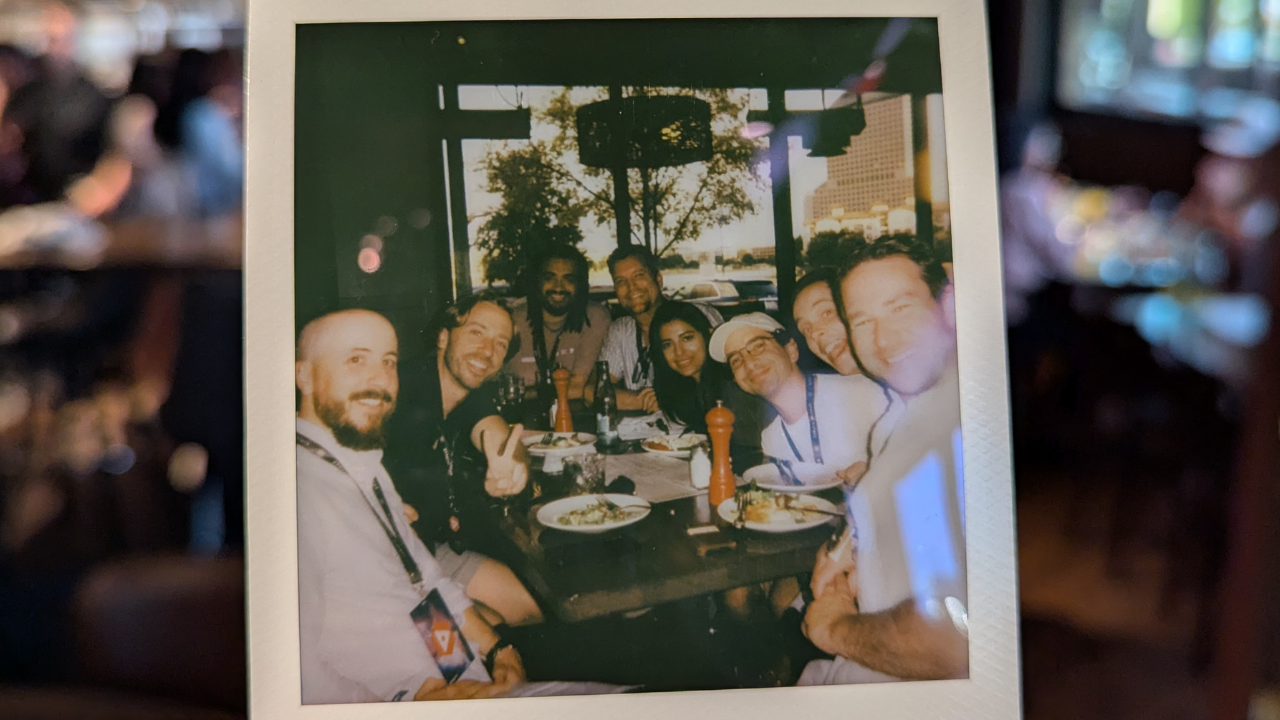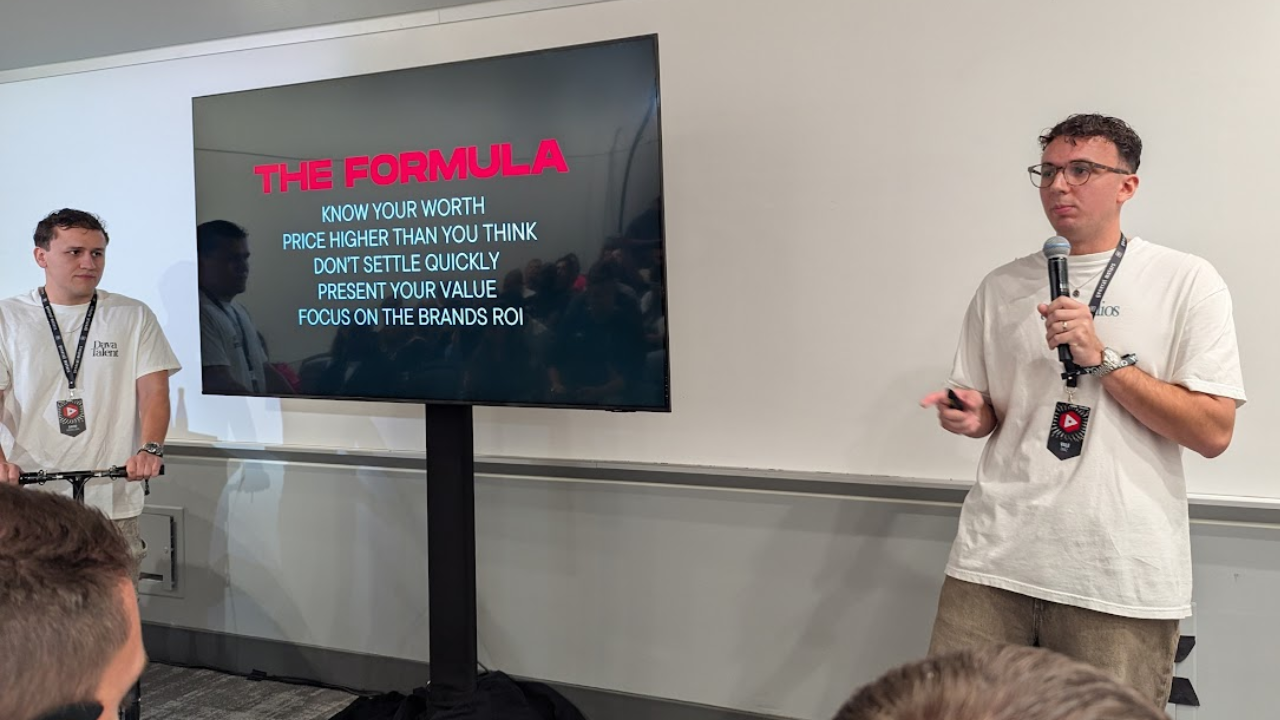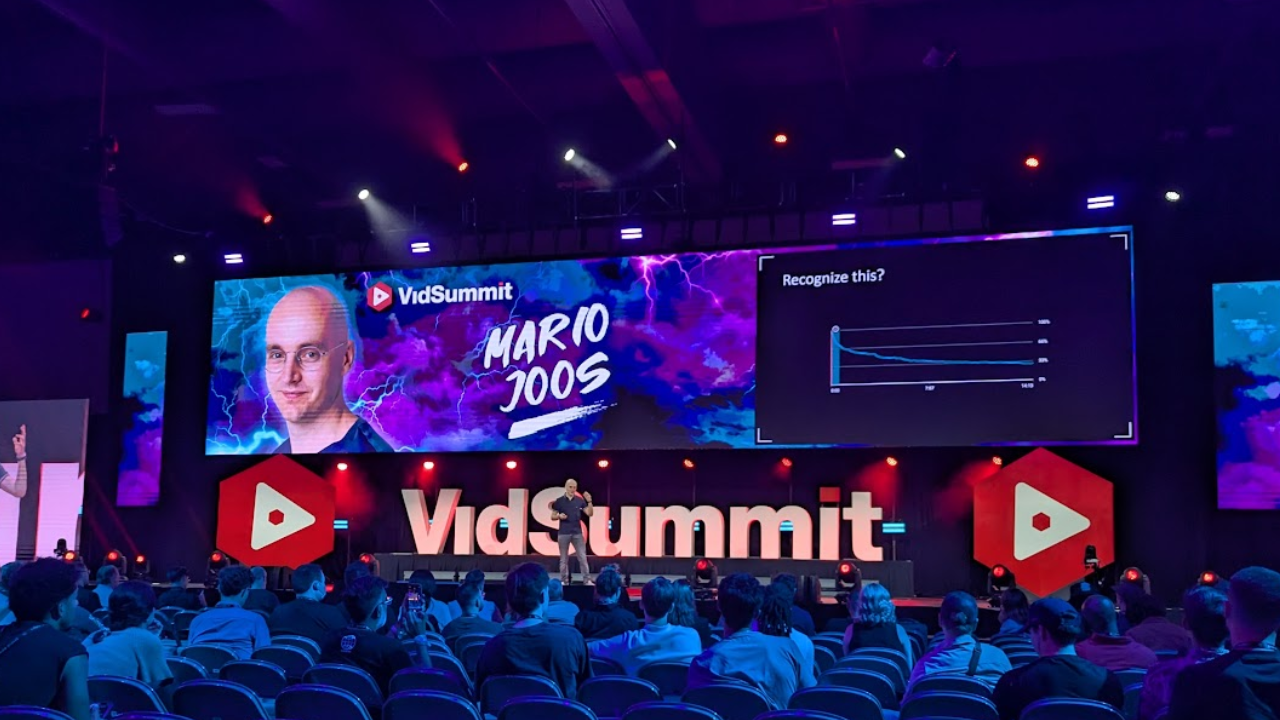What We Learned at VidSummit 2025



From Oct 7th through Oct 9th, Dallas was filled with creators. But not the kind who came for selfies or panels about going viral... VidSummit has always been different. It’s where the world’s best YouTubers, operators, and creator-focused companies gather to share what they are building. No fans, no fluff, just creators helping creators build creator companies.
For the Spotter Studio team and Creator community, the week was a reminder of how far the creator economy has come. The conversations were less about algorithms and AI and more about what are the tools to help build better businesses: contracts, hiring, IP protection, and long-term sustainability. The message was clear: Creators are more than just video content creators; they’re running complex companies.
In this piece, we’re sharing our top five learnings to help you make the most out of 2025 and hit the ground running in 2026:

1. Nurture Your Creator Community
Between panels and presentations, the real energy and value of VidSummit flowed through the hallways, lobbies, and late-night meetups. For the team and the community, nothing captured that better than our Creator dinner. On Wednesday we had +45 members, partners and friends shared stories, learnings, and ideas about what’s working for their businesses. The dinner helped remind everyone that community is the foundation of every great creator journey.
Matty, In House Creator at Spotter and In Creator Company YouTube channel cofounder, summed it up best: “I met five or six creators on the first day and invited them to dinner. Afterward, they sent messages like, ‘I’m so glad we met—how can we keep in touch?’ It felt good to create something that brought people together.” That small act of outreach is now turning into long-term friendships and possibly new creative collaborations.
Rob, CSO at Spotter, saw that same spirit across the entire event. He recalled bumping into Airrack and talking about how they first met at VidSummit back in 2021. “It’s a reminder that someone you meet for the first time here could become a partner or friend years down the road,” Rob said. “You might meet a hundred people, have thirty real conversations, and fifteen first-time introductions. How many of those may be the longtime friends you see at VidSummit 2028? It could be 0, 1, 2 or even 5... so follow up, invest in those relationships.”
Even David, In House Creator at Spotter, attending VidSummit for the first time, described it as a “small-world moment” that put the entire creator ecosystem in one place. “When you look at the thousands of people at this conference,” he said, “you realize this is the industry. These are the people creating the software, repping the talent, doing the capital deals. It's a small village of amazing professionals who make the whole creator economy run.”
At the end of the day, community is still a creator’s strongest asset. VidSummit proved it. Growth starts with real connection and community. The best ideas are still sparked in real life vs creating from the closet.

2. Run Your Channel Like a Company
If there was one theme that united every panel, conversation, and Westin lobby conversations, it was this: creators are no longer just individuals - they’re CEOs of their own creator companies.
Amanda shared a blueprint for sustainable growth that felt more like a business masterclass than a YouTube talk. She explained how they scaled from a single channel into a seven-figure business by hiring early, building a team of ten, and setting up repeatable systems for production. Her advice to up-and-coming pros was simple: recruit before you think you’re ready. Build a deep bench of editors, producers, and contractors so your media company can keep running even when you can’t.
That same shift in mindset was visible across VidSummit from creators tightening their operations to major established companies entering the space. As Rob noted, “One of the largest charitable foundations in the country was here this year. They’ve worked with giant corporations and sports leagues for decades, and now they’re coming to VidSummit to partner with creators. They see the size and influence of this community and how it drives culture and commerce.”
She also reminded creators to protect what they’re building. Clauses that grant “usage in perpetuity” or “exclusivity across all categories” might seem harmless at first, but they can lock you out of future partnerships. As Amanda put it, forever is a long time, and creators need to own their name, face, and work the same way a company owns its IP.
That business-minded approach carried through to David and Vale cofounders of Dava, who unpacked how creators leave money on the table every day. They urged creators to think like dealmakers charging for paid usage, limiting exclusivity, and negotiating commissions for performance. A single contract tweak can turn a 2.5X your compensation and create a deep partnership vs a one-off brand integration. The pros in 2025 aren’t chasing more deals: they’re structuring smarter ones.
Looking ahead, Rob pointed to the rise of YouTube creators expanding beyond the platform. The Tubi session stood out to him because “scripted, high-quality, long-form YouTube content is now working on TV platforms like Tubi. That would not have been true three or five years ago. YouTubers are actually TVers now.”
Success on YouTube now takes more than creativity. It takes systems, strategy, and a willingness to think like a CEO. The next generation of creators isn’t just growing their channel, they are building businesses.

3. Protect What You Create
If last year was all about AI tools, this year was about intellectual property (and for good reason). More creators are learning the hard way that a bad contract can cost far more than a missed upload. VidSummit 2025 was filled with lawyers, accountants, and managers breaking down what it means to truly own your work.
Amanda told the story of a young Dave Chappelle signing away the rights to his own show as a cautionary tale for creators today. Her takeaway: never sign anything you don’t fully understand. Brands and partners might not have bad intentions, but every line in a contract matters. Clauses granting “usage in perpetuity throughout the universe” aren’t just legal fluff. They give away your likeness forever.
Creators were also reminded that fairness goes both ways. Amanda shared how she refused to sign a deal that banned her client from working with any financial company, calling it “over the line.” The point wasn’t to fight every clause, but to know where to draw boundaries.
Even outside of the legal talks, the message resonated through the halls: creators are learning to act less like talent and more like owners. They’re hiring representation, diversifying income, and making sure every partnership aligns with long-term goals.
The Creator Economy is maturing fast, and the creators who will last are the ones treating their ideas, their image, and their IP like the valuable assets they are.

4. Build Your Creator Operating System
In the past, conversations were dominated by buzzwords and frontier text: AI, blockchain, automation, etc... This time, the focus was on building infrastructure. How do you create a system around your creativity that can actually scale?
The mix of attendees told the story. Alongside creators were lawyers, accountants, brand managers, editors, investors, and software teams all working toward the same goal: helping creators build a sustainable business. “If you want to go fast, go alone,” Matty said. “But if you want to go far, go together.”
Jarad from the Studio team described it as the evolution of the “creator operating system,” where professionals and partners fill key roles that used to fall solely on creators. From legal protection to financial planning to idea validation, the modern creator stack looks a lot more like a startup than a solo venture.
The focus wasn’t on what tools might change the game next, but it was on building the team and systems that make success repeatable.

5. Longevity > Virality
The creators who stood out at VidSummit weren’t the ones chasing the newest trend. In fact, Sora 2 was only mentioned once at the Creator dinner as far as we could remember. The Creators who stood out were the ones building systems to stay consistent. Across panels and conversations, one message kept resurfacing: short-term virality fades, but structure scales.
Amanda reminded everyone that time is a creator’s most limited currency. Bringing on help early, setting clear revision limits, and paying for outcomes keep you creating consistently without running yourself into the ground.
David summed it up from his own experience at the event: creators already know how to make great videos—the opportunity now is to turn that creative success into real businesses. He described it as the next phase of the creator economy, where “the direction is taking your content and building a business on top of it—something that lasts and fits the kind of creator you want to be.”
That longevity mindset echoed across Creator conversations at the dinner tables and at VidSummit floors in the Irving Convention Center. Creators were talking about building teams, diversifying revenue streams, and how to protect their energy for the long run. One creator put it simply over dinner: “A video can only be as good as the idea behind it.” The same goes for your creator company. The creators who will win in 2026 and beyond are the ones turning that discipline into systems that make success repeatable.
Final Note
VidSummit 2025 marked a clear shift in the creator economy. Conversations centered on building stronger systems, owning your work, and forming real partnerships that last. The team and the growing Spotter Studio Community share that vision: helping creators turn ideas into repeatable processes, sustainable businesses, and lasting independence. It was a week that reminded us why we’re all here: to keep creating, keep learning, and keep building a future where creators’ ideas are nurtured and get room to grow.




.png)
.png)